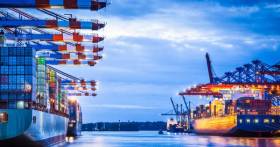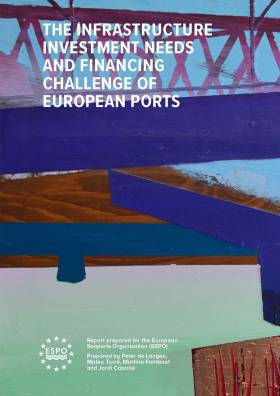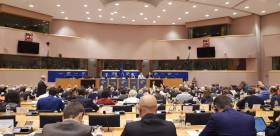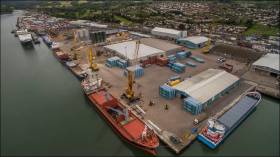Displaying items by tag: CEF II
Coalition of More Than 40 Organisations Call for Strong Connecting Europe Facility II
In advance of the European Parliament’s hearings of the commissioners-designate, a coalition of more than 40 European associations and organisations renewed their call for a strong transport budget according to the European Sea Ports Organisation.
While the previous European Parliament and the Council had agreed on a common understanding on the proposal for the Connecting Europe Facility 2021-2027 (CEF II), the budget will be decided by the upcoming negotiations of the Multiannual Financial Framework. The European Parliament had demanded an increased budget of €33.51bn (€37.76bn in current prices) for the transport envelope of the Connecting Europe Facility II.
Transport allows people to move, businesses and trade to grow, it enables the completion of the internal market, it enhances tourism and it connects all of Europe. Completing the TEN-T core network by 2030 and at the same time moving towards a truly green, climate neutral, integrated and digital transport system requires a large amount of investments and funding.
For these reasons, the coalition calls on the newly elected Members of the European Parliament and the incoming Commissioners to support the demand for an increased transport budget, including the proposed transfer of funds under the Cohesion envelope. The Connecting Europe Facility has proven to be a financial instrument delivering highly added value and will be instrumental in the decarbonisation of the European transport sector.
A study, commissioned by the European Sea Ports Organisation investigating the future investment needs of European ports, estimates that European ports face investment needs of around 48 € billion for the period 2018-2027. It also shows that port authorities have only been able to obtain 4 percent of the grant envelope over the last 4 years.
“The transport sector is facing huge challenges in terms of decarbonization and digitalisation. These challenges need to be addressed if we want to continue to ensure the connectivity within Europe and thus the well-functioning of the internal market. European seaports need to invest continuously to remain state-of-the-art and cater for their multifunctional role as gateways to trade, multimodal hubs, nodes of energy and clusters of industry and blue economy. The connecting Europe Facility is instrumental in preparing Europe’s ports for the future”, says ESPO’s Secretary General Isabelle Ryckbost.
The MFF4Transport coalition is representing all transport modes and nodes, infrastructure managers, operators, contractors, local and regional authorities, logistics service providers, shippers, users and equipment suppliers in the maritime, inland waterways, railways, road, cycling, aviation and intermodal sectors, as well as supporting industries and companies.
European Ports Organisation Welcomes Agreement on CEF II
#ports - European Seaports Organisation (ESPO) has welcomed the Common Understanding between the European Parliament and the Council on the future Connecting Europe Facility (CEF II).
With its vote yesterday, the European Parliament’s Transport and Industry Committees confirmed the partial agreement, which sets out the EU’s funding priorities and modalities in the transport sector for the period 2021-2027. The precise budget, as well as horizontal provisions such as Cohesion funding and the way third countries can participate in the programme will be negotiated under the new Parliament.
ESPO strongly supports the European Parliament’s call for an increased transport budget of €33.5 bn. The budget proposed by the European Commission is insufficient to complete the TEN-T network and to invest in a safe, modern and sustainable transport network. Moreover, ESPO believes the proposed €10 bn transfer from the Cohesion Fund to CEF II should be safeguarded.
“The Parliament has given a strong signal in favour of an increased transport budget for the coming years. We embrace this decision and hope it will be confirmed in the further negotiations. Completing the TEN-T network as foreseen is crucial for the future of Europe. But on top of that, enormous efforts are to be made in the field of decarbonisation and digitalization. We also hope that the proposed transfer from the Cohesion Fund to CEF II will be safeguarded. Cohesion policy aims at reducing the economic, social and territorial disparities that still exist in the Union. It is in that respect fundamental that the Cohesion countries can step up their transport infrastructure in line with the TEN-T priorities that apply to the entire Union.” says Isabelle Ryckbost, ESPO’s secretary general.
ESPO regrets that the definition of cross-border links has been weakened by the Council. For European ports, it is important to recognise the cross-border nature of projects, which are carried out in one Member State, but which have a substantial cross-border impact. Given their role as gateways to cross-border trade and the cross-border impact of port projects, ports should be considered as international in nature and thus be placed on an equal priority with cross-border projects. In this regard, ESPO welcomes that any type of cross-border cooperation is recognised rather than the mandatory set-up of a single project company.
ESPO believes that in order to achieve a fully integrated and operational TEN-T network, more attention needs to be given to the maritime pillar and to ports within the TEN-T network. European ports are not only essential nodes of transport and logistics, linking maritime with all others modes of transport, they have also developed into important nodes of energy, industry and blue economy. In order to fulfil their role as sustainable, efficient and state-of-the-art ports, continuous investments are needed.
“Even if they are situated on the territory of one country, ports have a fundamental role to play in enhancing the cross-border connectivity within Europe and between Europe and the world. This cross-border impact should be better recognised in the future. Next to their role as transport nodes, Europe’s seaports are nodes of energy, industry and blue economy. They are strategic areas for Europe’s growth. Port authorities are managing these complex port ecosystems and can be drivers of change well beyond the port area.” adds Isabelle Ryckbost.
European Ports call on the policy makers to continue the negotiations on the basis of the Common Understanding and call for a swift adoption of CEF II to ensure a timely preparation of the Work Programmes.
The EP plenary vote of this agreement is scheduled for the 15-18 April Strasbourg session. To download Port Investment Study click here.
EPSO Welcome European Parliament Transport Committee Result on Connecting Europe Facility II
#Ports&Shipping- At the European Parliament's Committee on Transport and Tourism and the Industry Committee jointly yesterday adopted the Marinescu- Telička- Virrkkunen report on the Connecting Europe Facility proposal 2021-2027.
The European Sea Ports Organisation (ESPO) welcomes the demand for an increased budget for transport. Members of the committees voted to raise the general envelope of the CEF transport budget by €7bn to €33.51bn (in constant prices). The significant role of transport for the development of the Union had been equally recognised by the Parliament’s request for a higher CEF transport budget during the vote on the next MFF.
ESPO particularly appreciates the recognition of the cross-border potential of port projects. Port projects, which are carried out in one Member State, can nevertheless have a substantial cross-border impact, by enhancing connectivity on the sea side, or in the hinterland beyond the borders of a single Member State.
For the first time, the Commission proposed to include an envelope for military mobility in the transport budget. With their vote the Committees have strengthened the civilian priority of dual-use projects eligible under this priority, which addresses one of ESPO's main concerns. ESPO welcomes the broadening of the scope from the exclusive focus on enabling the movement of military troops and equipment, to also cover investments in cyber security resilience and for security and civil protection purposes.
ESPO Secretary-General Isabelle Ryckbost said: "We would like to congratulate the Transport Committee and thank in particular the rapporteurs for achieving a compromise that clearly strengthens the Commission proposal in terms of budget but also in terms of priorities. The Parliament clearly recognizes the importance of strengthening the cross-border connectivity not only on the land side but also on the maritime side. We hope a solution can be found with the Council, which gives the necessary importance to Motorways of the Sea. In the last 3 years only 4 % of the budget was spent on port projects, whereas 95% of world trade goes over sea and 70% of rail freight is coming from the ports."
ESPO remains concerned about the priorities listed in the Annex. Both, Motorways of the Sea (MoS) as a horizontal priority, as well as all maritime and port projects, which are included in the current CEF priorities, have been deleted from the listed priorities.
ESPO considers the maritime dimension of the TEN-T network, and ports as the strategic links between waterborne and land-based transport, as fundamentally important for the connectivity within Europe and with third countries. This importance should be better reflected by the Connecting Europe Facility 2021-2027.
The vote of the European Parliament has been scheduled for the December plenary. The negotiations between Council and Parliament are expected to start early 2019.
ESPO Asks to Recognise Cross-Border Dimension of EU Ports & Strengthen Maritime Connectivity
#Ports&Shipping - Over the next decade the investment needs of European ports amounts to 48 billion EUR, according to a report by the European Sea Ports Organisation (ESPO).
Many port investments score high in creating societal value but the return on investment for the investor, the port managing body, is often low and slow. For these investments, external funding is needed. Ports have only been able to obtain 4% of the CEF transport budget over the last three years. These are the main results from the Study ESPO launched in spring 2018 in preparation of the Connecting Europe facility II proposal which came out on 6 June 2018.
ESPO welcomes the CEF II proposal and appreciates the efforts that have been made to further optimise and ensure the continuation of this important financial instrument for transport.
“ESPO is fully recognising the importance and benefits of the Connecting Europe Facility; we should use the experience of the past three years to further optimise this instrument; we count on the European Parliament and the Council to safeguard the budget proposed, which is a real minimum. Given their important role as nodes of transport, energy, industry and blue economy ports deserve more than the 4% share they obtained over the last three years. Concretely we believe that ports and the maritime dimension should be better recognised under the cross-border priority. Seaports have the potential to link any number of Member States through maritime transport, as well as to link the sea with a wide hinterland and economic area that in most circumstances exceeds the national borders. They are by nature cross-border and should be recognised in that respect”, says ESPO’s Secretary General Isabelle Ryckbost.
Based on the outcome of the ESPO study, ESPO formulated concrete recommendations and suggestions in its position paper to further optimise the Commission proposal.
ESPO asks the Parliament and Council to:
- ensure that an increased share of the CEF budget is accessible to ports, reflecting their essential role in the European Transport network;
- recognise the cross-border nature of ports and the maritime cross-border dimension which has the potential to link a port not only with their neighbours but with all other maritime Member States;
- re-integrate the currently pre-identified port and MoS projects in the Annex of pre-identified sections of the new proposal;
- put more emphasis on the decarbonisation investments to be made;
- better define the military mobility budget share, which will receive 1 on 5 EUR of the CEF transport budget and to prioritise the transport policy priorities in defining the dual-use;
- use the military mobility budget to enhance the resilience of Europe’s infrastructure and, in particular its port infrastructure, to cyber security threats and ensure that ports can play their vital role as part of the emergency supply chain;
- exempt projects with a limited impact on the national transport network from Member State endorsement;
- highlight the importance of the maritime connections of the EU with its neighbouring countries;
- ensure optimal connectivity of Ireland to mainland Europe in the context of Brexit;
- foresee a review mechanism following the review of the TEN-T guidelines in 2023 and the outcome of the Brexit negotiations.
The proposal is currently under discussion in the Parliament and the Council. Last week, the EP-TRAN rapporteurs, Pavel Telička (ALDE, CZ) and Marian-Jean Marinescu (EPP, RO), presented their draft report (read or download) in the TRAN Committee. The deadline for amendments is 13 September.

































































